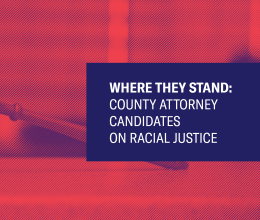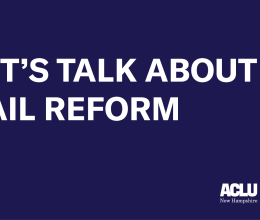
Today, the ACLU-NH filed a "friend of the court" brief in support of the disclosure to the Valley News, the Union Leader Corporation, and Hearst Properties, Inc. (including WMUR-TV) of the four (4) videos depicting the events surrounding the fatal police shooting of Hagen Esty-Lennon in the town of Bath.
This is the first open records case in the country that the ACLU-NH is aware of where a court has been asked to decide whether body camera footage of a fatal police shooting should be disclosed under a state’s open records laws over a family’s privacy objections. This is undoubtedly an important question given that, while body camera footage is an invaluable tool in ensuring that law enforcement are acting properly in interacting with the public, the collection and release of such footage has the real potential to invade privacy.
Here, when balancing these competing interests in the individual circumstances of this case, the ACLU-NH argues that New Hampshire’s Right-to-Know Law (Chapter 91-A) requires disclosure, especially given its broad presumption of transparency. While the privacy interests raised by Mr. Esty-Lennon’s family are real and should be carefully balanced by the Court, the public’s competing interest in seeing uniquely reliable evidence of the law enforcement response to a person apparently in severe emotional distress, which resulted in the person’s death, is stronger.
We give few government officials as much authority as the power we give to police to take human life based on split-second judgments. Thus, the public has a correspondingly compelling interest in understanding how the police exercise that authority, particularly when lethal force is used on individuals suffering from mental health crises. The public’s interest in disclosure is even more acute where there are, as counsel for Mr. Esty-Lennon’s estate has acknowledged, still open questions about the use of force in this case and whether deescalation techniques could have been utilized that would have lessened the need for lethal force. These questions can only be answered through disclosure of the videos in question, especially where the videos appear to be the only neutral evidence available.
Of course, most police officers perform their duties with distinction. Here, the video footage may very well exonerate the two Haverhill police officers who killed Mr. Esty-Lennon. This was the conclusion of the Attorney General and, if it is accurate, disclosure may even alleviate any public uncertainty as to whether the shooting officers are fit for duty. But the press and the public are not required to simply defer to the Attorney General’s judgment. Instead, the press and the public are entitled to independently vet the conclusions reached by the Attorney General, especially when the conclusions concern a lethal use of force against someone who may have been in desperate need of help. This is why the press exists: to monitor the administration of justice on behalf of the public and be its “eyes and ears” into the criminal justice system.

